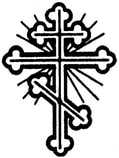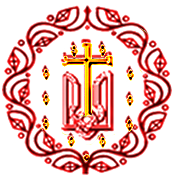PROPER CHURCH ETIQUETTE
IN THE HOLY ORTHODOX TEMPLE OF GOD....
In the Orthodox Church, there are numerous customs and traditions that are important parts of our worship. Some of these customs are universal to the Church, while some may vary from parish to parish, or cultural tradition.
Upon entering an Orthodox Church, at all times, but especially during services, an individual should remember that he or she is in the House of God. Reverence and good manners are required so as not to disturb those who are already engaged in prayer, but, even more importantly, as an expression of sincere faith and awareness of the presence of the Lord.
This information acts as a guide and not simply as a list of "dos and don'ts.
ENTERING THE CHURCH - ARRIVE ON TIME AND BE PREPARED:
The Orthodox Divine Liturgy begins when the priest intones, "Blessed is the Kingdom of the Father, and the Son, and the Holy Spirit.” The time to arrive at church is before the service starts, to receive this blessing, but for some unknown reason, it has become the custom, or rather the bad habit, for some to come to church late.
·
- Refrain from socializing during the Liturgy - Save your greetings and conversations for the fellowship. We are in the Liturgy to greet God with our prayers and worship, not to distract others.
- Cell phones and texting are never allowed in the church - If you have a professional reason to carry a phone or pager for emergencies, keep it on mute, not vibrate, and sit near the exit so that leaving for an emergency will not be a distraction to others. Otherwise, turn off your phone before entering the sanctuary.
- Prepare your offering - Please have your offering ready before you arrive for church. Offering envelopes are available in many parishes to take home and are also usually available at the entrance or near candles for donations. There may also be offering envelopes in the pews for visitors.
MAKING THE SIGN OF THE CROSS:
A person looking around on a Sunday morning may notice that different people cross themselves at different times. To a certain extent, when to cross oneself is a matter of personal piety and not of dogma. However, there are times in the service when crossing oneself (thumb and first two fingers touching each other, third and fourth fingers folded into the palm: touching head first, to stomach, right shoulder to left) is called for:
To Cross: when you hear one of the variations of the phrase “Father, Son, and Holy Spirit”; before venerating an icon, Gospel, or Cross; when blessed with an icon, Cross, Gospel, or Chalice; entering and exiting the Temple; when passing before the Holy Altar.
Optional to Cross: (with bowing of the head): when blessed with hand (as in “Peace be to all”), or censed. In receiving a blessing from a Bishop or Priest one does not make the sign of the Cross beforehand. (In this way ought we to distinguish between reverence toward holy things and toward persons.) At the Chalice before or after receiving Holy Communion (be careful not to hit the Chalice with your hand).
LIGHTING CANDLES:
Lighting candles is an important part of Orthodox worship. Candles are lit as an expression of our belief that Jesus Christ is the “Light of the world.” We light them as we pray, making an offering to accompany our prayers. In many Churches, candles are lit for the Living on candle stands on the right side (looking to the front) and on the left side for the Departed. Orthodox typically light candles when coming into the church, and that is usually the best time to light them, but there are times when candles should not be lit. It is not proper to light candles during the Epistle or Gospel readings, during the Little or Great Entrances, and during the sermon as it disrupts the Divine Liturgy.
VENERATING ICONS:
The Orthodox Church teaches that it is proper to venerate, not worship, icons. Icons are not simply portraits representing people, but graphic presentations of spiritual truths that are visual aids to contemplation and prayer. Icons are considered to be “windows into Heaven.” When we venerate icons the honour is directed to Christ or to the Saint depicted on the icon, not to the wood, paint, or colors of the icon. The acceptable way to do this is to kiss either the hands or feet of the saint depicted in the icon, or the scroll, the Gospel Book, or the Hand Cross a Saint is holding, Please do not wear lipstick when kissing the icons since the residue will ruin them.
STANDING VS SITTING:
The entire life of an Orthodox Christian, according to the Scriptures should be in continuous Spiritual uprightness and attentiveness toward God. The Apostle Paul says: "Watch ye, stand fast in the faith" (I Cor. 16:13); ''Stand ,therefore, having your loins girt about with truth (Ephes. 6:14); "Stand fast in the Lord, my dearly beloved" (Philippian 4:1). If a Christian must always stand on guard spiritually over his salvation then he must do so even more during, the Divine Church Services, which serves as an expression and an enrichment to private everyday service to God.
The traditional posture for prayer and worship in the Orthodox Church has been to stand. In the Orthodox “old countries,” there are usually no pews in the churches. Chairs or benches on the side walls are usually reserved for the elderly and infirm. In North America, we have tended to build our churches with pews, and since we have them, we need to figure out when we may sit and when we should stand. When should you definitely stand? First of all, it is fully acceptable (even preferable) to stand for the entire service. But always during the Gospel reading, the Little and Great Entrances, the Anaphora, the distribution of Holy Communion, whenever the priest gives a blessing, and the Dismissal. It is never wrong to stand in church.
Outside of the Divine Liturgy, we stand: When the "royal doors" of the Holy Altar are opened, as a high point in the service is about to take place and in general when the Priest comes out of the altar facing the people or censing.
LEG CROSSING:
One should not be too casual in the Divine Liturgy. Keeping your feet on the ground also enables you to remain attentive and to stand when necessary.
Should we cross our legs in the Temple during services? No. Not because it is wrong to ever cross your Legs, but because it is too casual, and too relaxed, for being in the Temple. Just think about it, when you get settled into your favourite chair at home, you lean back, cross your legs, and then your mind can wander anywhere it wants to. When sitting in the Temple, keep your feet flat on the floor, ready to stand at attention (which, after all, is precisely what "Let us attend!" means). The rule is, cross yourself with your fingers and hand but do not cross your legs in the Temple of God!
LEAVING EARLY BEFORE THE DISMISSAL:
Leaving church before the Dismissal, besides being rude, deprives us of a Blessing. Worship has a beginning (“Blessed is the Kingdom…”) and an end, with the Prayers of St. Simeon, (“Lord, now lettest Thou Thy Servant depart in peace…”). To leave immediately after Communion is to treat church like a fast food restaurant where we come and go as we please. We live in a fast-paced world where we seem to be hurrying from place to place. But in God’s presence, we need to make every attempt to fight this pressure to move on to the next thing on the day’s agenda. We deprive ourselves of many Blessings by not being still and participating in God’s holiness.
Stay in church and thank God for his precious gifts.
FINAL THOUGHT:
Our North American culture of the 21st Century is rather casual, even subtly anarchist, in its approach to life.
Dress, music, language, values, morals, and entertainment all reflect a trend to “downgrade” life from what God intended it to be. We must not allow this prevailing tendency to enter into our Christian piety, whether at home or at church. Most church etiquette is based on simple common sense and a respect for God and others.
We are in church to worship God in the Holy Trinity. The priest announces, “With fear of God, and faith and love, draw ye near.”
If we approach our lives and our worship together with this in mind, then we will be people of proper Church Etiquette.


